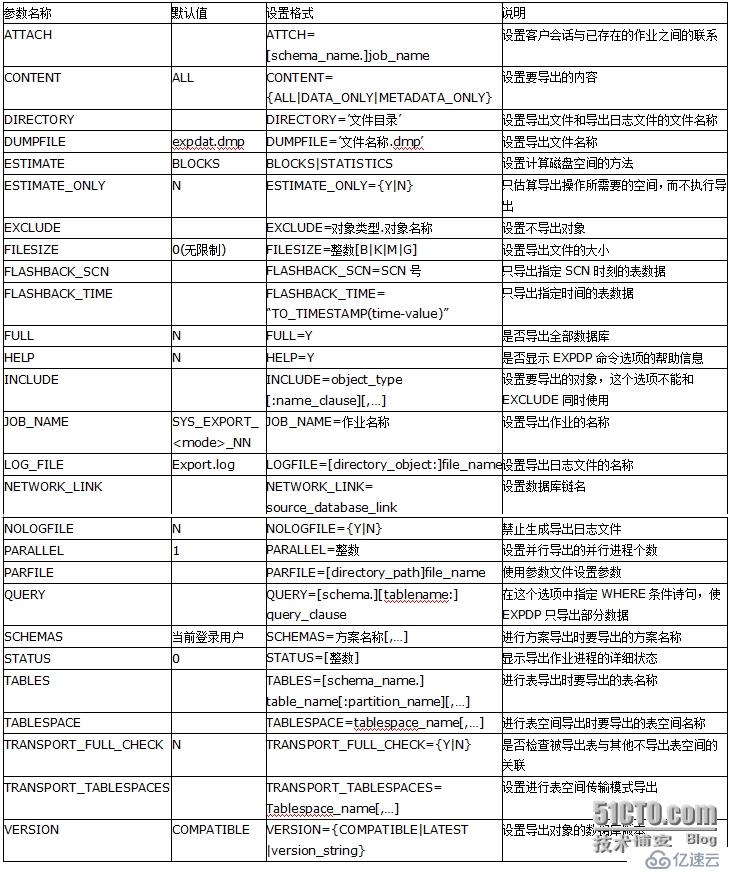再续解密Oracle备份工具-expdp/impdp
在这个信息的时代,数据规模和数据量的增长以爆炸式的速度扩张。之前几百M或数G规模的数据量都堪称庞大。现如今测试系统所占空间都是这一数据的几十倍甚至百倍。原生imp/exp工就这两匹老马在处理这么大的数据量就力不从心了。从10g开始,data pump横空出世,中文名叫数据泵。
数据泵的优点
a.为数据及数据对象提供更细微级别的选择性(使用exclude,include,content参数)
b. 可以设定数据库版本号(主要是用于兼容老版本的数据库系统)
c. 并行执行
d.预估导出作业所需要的磁盘空间(使用estimate_only参数)
e.支持分布式环境中通过数据库链接实现导入导出
f.支持导入时重新映射功能(即将对象导入到新的目标数据文件,架构,表空间等)
g. 支持元数据压缩及数据采样
要使用data pump工具,要指定一个directory对象。
什么是directory对象?
a. 字面意思就是目录,它不是实体,只是一个指向,指向操作系统中的一个具体路径。
b. 每个directory对象都有read、write两个权限,通过grant授权给指定用户。
c.拥有directory对象的read/write权限的用户就可以读/写该directory对象实际指定的操作系统路径下的文件。
一、目录操作
1、在操作系统层面创建目录
mkdir /home/oracle/expdp2、在库中创建目录、并授权给scott用户
sqlplus / as sysdba
SQL> create directory expdp as '/home/oracle/expdp';
SQL> grant read,write on directory expdp to scott;3、查看当前库中所有目录
SQL> select OWNER','DIRECTORY_NAME','DIRECTORY_PATH from dba_directories;二、expdp 参数说明:

1、导出某用户下所有对象
expdp scott/lipengfei directory=expdp dumpfile=scott_all.dmp SCHEMAS=SCOTT logfile=scott_all.log
2、导出部分表
(1)expdp scott/lipengfei directory=expdp dumpfile=scott_emp.dmp tables=\(emp,dept\) logfile=scott_emp.log (2)expdp scott/lipengfei directory=expdp dumpfile=scott_E_D.dmp tables=\(scott.E%,scott.D%\);
3、指定条件导出
expdp scott/lipengfei directory=expdp dumpfile=scott_emp.dmp logfile=scott_emp.log tables=emp query=\"where sal \>1000\"4、导出时除某对象【静态收集信息,序列,视图,表】
expdp scott/lipengfei exclude=STATISTICS,SEQUENCE,VIEW,TABLE:\" IN \(\'EMP\',\'DEPT\'\)\" directory=expdp dumpfile=scott_2015_06_02.dmp logfile=scott_2015_06_02.log
5、导出同时压缩dmp文件(compression=ALL,此值在11g中才有)
(1)创建测试表,并insert大量数据
create table li nologging as select * from all_objects;
insert into li select * from li;
/
/
/
/
commit;
(2)查看测试表所在物理大小
select segment_name,bytes/1024/1024 from user_segments where segment_name=’LI';
(3)导出测试表,并加上compression=ALL参数
expdp scott/lipengfei directory=EXPDP dumpfile=scott_all_compression.dmp SCHEMAS=SCOTT logfile=scott_all_compression.log compression=ALL
(4)导出测试表
expdp scott/lipengfei directory=EXPDP dumpfile=scott_all.dmp SCHEMAS=SCOTT logfile=scott_all.log
(5)查看2次导出dmp文件的大小
ls -lh *.dmp 【通过查看文件大小,可以看出加上compression=ALL参数后,压缩比堪比"gzip -9"】
(6)对dmp文件进行第二次压缩
zip scott_all_compression.zip scott_all_compression.dmp6、content为all 时,将导出对象定义及其所有数据.为data_only时,只导出对象数据,为metadata_only时,只导出对象定义
expdp scott/lipengfei directory=EXPDP dumpfile=scott_metadata_only.dmp content=metadata_only logfile=scott_metadata_only.log
ls -lh *.dmp【通过查看文件大小,可以只导出对象定义,dmp文件很小】三、impdp 参数说明:

1、导入某用户所有对象
(1)创建表空间
SQL> create tablespace lipengfei datafile '/home/oracle/app/oracle/oradata/ecom/lipengfei.dbf' size 100M AUTOEXTEND OFF;
(2)创建用户指定密码及默认表空间
SQL> create user lipengfei identified by lipengfei default tablespace lipengfei;
(3)解锁新创建的用户
SQL> alter user lipengfei account unlock;
(4)给新建的用户授权最基本的角色及权限
SQL> grant connect,resource to lipengfei;
SQL> grant create table to lipengfei;
SQL> grant create view to lipengfei;
(5)将数据泵指定的directory读写权限授权lipengfei
SQL> grant read, write on directory EXPDP to lipengfei ;
(6)登录lipengfei,创建表及数据初始化
sqlplus lipengfei/lipengfei
create table hehe(a int,b varchar2(10));
insert into hehe values(2,'d');
insert into hehe values(4,'e');
insert into hehe values(6,'f');
commit;
create view nimei as select a from hehe;
create table haha(id int);
insert into haha values(1);
commit;
(7)导出lipengfei用户所有对象
expdp lipengfei/lipengfei directory=expdp dumpfile=lipengfei_all.dmp SCHEMAS=LIPENGFEI logfile=lipengfei_all.log
(8)登录lipengfei模拟数据全部丢失
sqlplus lipengfei/lipengfei
drop view nimei;
drop table hehe;
drop table haha;
(9)把上面导出的数据还原回lipengfei用户
impdp lipengfei/lipengfei directory=expdp dumpfile=lipengfei_all.dmp logfile=lipengfei_all.log2、导入的对象已存在
当使用IMPDP完成数据库导入时,如遇到表已存在时,Oracle提供给我们如下四种处理方式:
a.忽略(SKIP,默认行为);
b.在原有数据基础上继续增加(APPEND);
c.先DROP表,然后创建表,最后完成数据插入(REPLACE);
d.先TRUNCATE,再完成数据插入(TRUNCATE)。
impdp lipengfei/lipengfei directory=expdp dumpfile=lipengfei_all.dmp TABLE_EXISTS_ACTION=TRUNCATE logfile=lipengfei_all.log
3、lipengfei用户数据 导入 shiqiang用户
(1)创建表空间
SQL> create tablespace shiqiang datafile '/home/oracle/app/oracle/oradata/ecom/shiqiang.dbf' size 100M AUTOEXTEND OFF;
(2)创建用户指定用户及默认表空间
SQL> create user shiqiang identified by shiqiang default tablespace shiqiang;
(3)将新建用户解锁
SQL> alter user shiqiang account unlock;
(4)授权新建用户最基本的角色及权限
SQL> grant connect,resource to shiqiang;
SQL> grant create table to shiqiang;
SQL> grant create view to shiqiang;
(5)将数据泵指定的directory读写权限授权shiqiang
SQL> grant read, write on directory EXPDP to shiqiang ;
(6)将lipengfei用户的导出的dmp文件,导入shiqiang用户中
impdp shiqiang/shiqiang directory=expdp remap_schema=lipengfei:shiqiang remap_tablespace=lipengfei:shiqiang dumpfile=lipengfei_all.dmp logfile=lipengfei_shiqiang.log ;4、只导入部分表
(1)模拟数据丢失
sqlplus lipengfei/lipengfei
drop view nimei;
drop table hehe;
drop table haha;
(2)将之前备份的dmp文件还原回lipengfei用户,并指定只恢复haha表
impdp lipengfei/lipengfei directory=expdp tables=haha dumpfile=lipengfei_all.dmp logfile=lipengfei_only_haha.log
(3)数据恢复后查看
sqlplus lipengfei/lipengfei
select * from hehe;
select * from haha;5、高版本导入低版本
(1)11g导出,并指定version参数 expdp shiqiang/shiqiang directory=expdp dumpfile=shiqiang_11g_all.dmp SCHEMAS=SHIQIANG logfile=shiqiang_11g_all.log version=10.2.0.1.0 (2)10g导入 impdp shiqiang/shiqiang directory=expdp dumpfile=shiqiang_11g_all.dmp logfile=shiqiang_11g_all.log
虽然oracle对自己产品的宣传一向有夸大的传统,不过大家要理解,有了前面原生的exp/imp工具的铺垫,对比来看,数据泵的导入和导出,有了很大的提升。
如果你之前有使用过exp/imp工具,通过上面expdp/impdp的一些例子,我相信你可以真正感受到,什么叫高效!
亿速云「云服务器」,即开即用、新一代英特尔至强铂金CPU、三副本存储NVMe SSD云盘,价格低至29元/月。点击查看>>
免责声明:本站发布的内容(图片、视频和文字)以原创、转载和分享为主,文章观点不代表本网站立场,如果涉及侵权请联系站长邮箱:is@yisu.com进行举报,并提供相关证据,一经查实,将立刻删除涉嫌侵权内容。